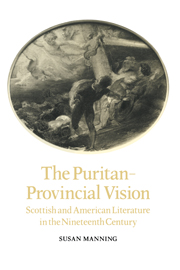Book contents
- Frontmatter
- Contents
- Preface
- Acknowledgements
- 1 Calvin's theology and the puritan mind
- 2 After Armageddon: Jonathan Edwards and David Hume
- 3 From puritanism to provincialism
- 4 The pursuit of the double
- 5 Spectators, spies and spectres: the observer's stance
- 6 ‘Is anything central?’
- Notes
- Bibliography
- Index
5 - Spectators, spies and spectres: the observer's stance
Published online by Cambridge University Press: 21 January 2010
- Frontmatter
- Contents
- Preface
- Acknowledgements
- 1 Calvin's theology and the puritan mind
- 2 After Armageddon: Jonathan Edwards and David Hume
- 3 From puritanism to provincialism
- 4 The pursuit of the double
- 5 Spectators, spies and spectres: the observer's stance
- 6 ‘Is anything central?’
- Notes
- Bibliography
- Index
Summary
The mind is a kind of theatre, where several perceptions successively make their appearance; pass, re-pass, glide away, and mingle in an infinite variety of postures and situations.
(David Hume)Ah that Distance! what a magician for conjuring up scenes of joy or sorrow, smoothing all asperities, reconciling all incongruities, veiling all absurdness, softening every coar[se]ness, doubling every effect by the influence of the imagination.
(Walter Scott)We soon tire of things which we visit merely by way of spectacle, and with which we have no real and permanent connection. In such cases, we very quickly wish this spectacle to be taken away, and another substituted.
(Nathaniel Hawthorne)The narrative of flight and pursuit dramatises the puritan–provincial search for ‘unlawful’ knowledge and its theological, psychological and literary consequences. This chapter considers the fallen state, the alienation and failure of faith which both unjustified puritans and provincials find in themselves. Once again the Calvinist structure of perception provides an analogy for the provincial viewpoint and a metaphor for the artist. In the provincial fiction considered in chapter 4, the concept of ‘sympathy’ tended always to undermine the boundaries between self and other. This chapter shows how the breakdown of the ‘covenant of meaning’ distances self from other and overemphasises the inscrutability of appearances until, to the observer, surfaces become entirely devoid of ‘content’. This may occur within a fiction, or – even more crucially – between the narrator or author and reader. The puritan-provincial divorce of manner from matter (the ‘rhetoric of distance’) has a striking effect upon nineteenth-century Scottish and American fiction.
- Type
- Chapter
- Information
- The Puritan-Provincial VisionScottish and American Literature in the Nineteenth Century, pp. 106 - 146Publisher: Cambridge University PressPrint publication year: 1990



